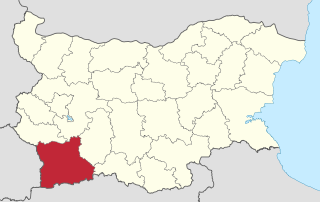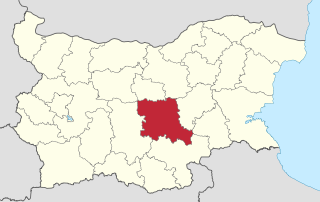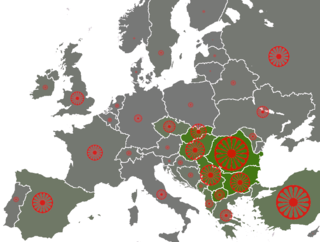Coordinates: 42°40′7.9″N23°21′37.8″E / 42.668861°N 23.360500°E

A geographic coordinate system is a coordinate system that enables every location on Earth to be specified by a set of numbers, letters or symbols. The coordinates are often chosen such that one of the numbers represents a vertical position and two or three of the numbers represent a horizontal position; alternatively, a geographic position may be expressed in a combined three-dimensional Cartesian vector. A common choice of coordinates is latitude, longitude and elevation. To specify a location on a plane requires a map projection.
 |
|---|
| This article is part of a series on the politics and government of Bulgaria |
Presidency |
|
Euroroma (Bulgarian : Евророма) is the biggest political party representing the interests of the Romani people in Bulgaria.

Bulgarian, is an Indo-European language and a member of the Southern branch of the Slavic language family.
A political party is an organized group of people, often with common views, who come together to contest elections and hold power in the government. The party agrees on some proposed policies and programmes, with a view to promoting the collective good or furthering their supporters' interests.

The Romani, colloquially known as Gypsies or Roma, are an Indo-Aryan ethnic group, traditionally itinerant, living mostly in Europe and the Americas and originating from the northern Indian subcontinent, from the Rajasthan, Haryana, and Punjab regions of modern-day India.
Established on 12 December 1998, Euroroma is not strictly an ethnic party, as it is open to everybody who shares its ideas and goals. In accordance with the stability pact, over 30% of the leadership of the political party are ethnic Bulgarians. Similarly, members of Euroroma's municipal and regional structures are not only Romani people, but also Bulgarians and Turks.
The Stability Pact for South Eastern Europe was an institution aimed at strengthening peace, democracy, human rights and economy in the countries of South Eastern Europe from 1999 to 2008. It was replaced by the Regional Cooperation Council (RCC) in February 2008. The RCC replaced it because it is more "regionally owned" than the Stability Pact, which was driven more by outside partners such as the EU.
Bulgarians are a South Slavic ethnic group who are native to Bulgaria and its neighboring regions.
Turkish people or the Turks, also known as Anatolian Turks, are a Turkic ethnic group and nation living mainly in Turkey and speaking Turkish, the most widely spoken Turkic language. They are the largest ethnic group in Turkey, as well as by far the largest ethnic group among the speakers of Turkic languages. Ethnic Turkish minorities exist in the former lands of the Ottoman Empire. In addition, a Turkish diaspora has been established with modern migration, particularly in Western Europe.















